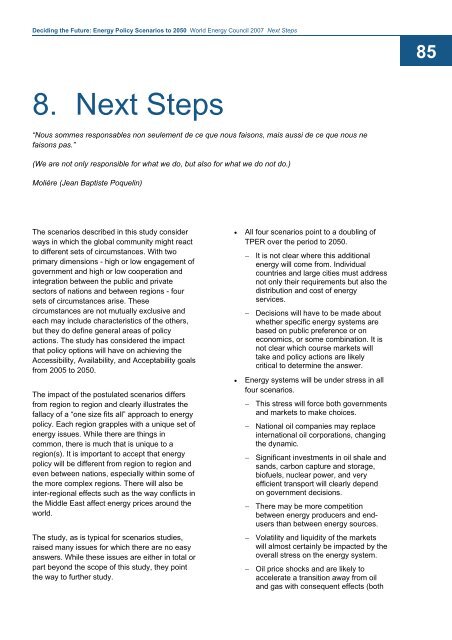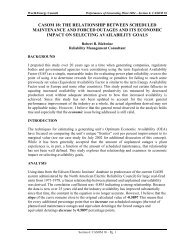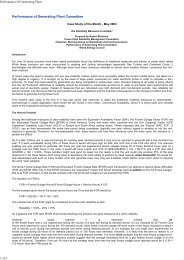Deciding the Future: Energy Policy Scenarios to 2050
Deciding the Future: Energy Policy Scenarios to 2050
Deciding the Future: Energy Policy Scenarios to 2050
You also want an ePaper? Increase the reach of your titles
YUMPU automatically turns print PDFs into web optimized ePapers that Google loves.
<strong>Deciding</strong> <strong>the</strong> <strong>Future</strong>: <strong>Energy</strong> <strong>Policy</strong> <strong>Scenarios</strong> <strong>to</strong> <strong>2050</strong> World <strong>Energy</strong> Council 2007 Next Steps<br />
85<br />
8. Next Steps<br />
“Nous sommes responsables non seulement de ce que nous faisons, mais aussi de ce que nous ne<br />
faisons pas.”<br />
(We are not only responsible for what we do, but also for what we do not do.)<br />
Moliére (Jean Baptiste Poquelin)<br />
The scenarios described in this study consider<br />
ways in which <strong>the</strong> global community might react<br />
<strong>to</strong> different sets of circumstances. With two<br />
primary dimensions - high or low engagement of<br />
government and high or low cooperation and<br />
integration between <strong>the</strong> public and private<br />
sec<strong>to</strong>rs of nations and between regions - four<br />
sets of circumstances arise. These<br />
circumstances are not mutually exclusive and<br />
each may include characteristics of <strong>the</strong> o<strong>the</strong>rs,<br />
but <strong>the</strong>y do define general areas of policy<br />
actions. The study has considered <strong>the</strong> impact<br />
that policy options will have on achieving <strong>the</strong><br />
Accessibility, Availability, and Acceptability goals<br />
from 2005 <strong>to</strong> <strong>2050</strong>.<br />
The impact of <strong>the</strong> postulated scenarios differs<br />
from region <strong>to</strong> region and clearly illustrates <strong>the</strong><br />
fallacy of a “one size fits all” approach <strong>to</strong> energy<br />
policy. Each region grapples with a unique set of<br />
energy issues. While <strong>the</strong>re are things in<br />
common, <strong>the</strong>re is much that is unique <strong>to</strong> a<br />
region(s). It is important <strong>to</strong> accept that energy<br />
policy will be different from region <strong>to</strong> region and<br />
even between nations, especially within some of<br />
<strong>the</strong> more complex regions. There will also be<br />
inter-regional effects such as <strong>the</strong> way conflicts in<br />
<strong>the</strong> Middle East affect energy prices around <strong>the</strong><br />
world.<br />
The study, as is typical for scenarios studies,<br />
raised many issues for which <strong>the</strong>re are no easy<br />
answers. While <strong>the</strong>se issues are ei<strong>the</strong>r in <strong>to</strong>tal or<br />
part beyond <strong>the</strong> scope of this study, <strong>the</strong>y point<br />
<strong>the</strong> way <strong>to</strong> fur<strong>the</strong>r study.<br />
• All four scenarios point <strong>to</strong> a doubling of<br />
TPER over <strong>the</strong> period <strong>to</strong> <strong>2050</strong>.<br />
− It is not clear where this additional<br />
energy will come from. Individual<br />
countries and large cities must address<br />
not only <strong>the</strong>ir requirements but also <strong>the</strong><br />
distribution and cost of energy<br />
services.<br />
− Decisions will have <strong>to</strong> be made about<br />
whe<strong>the</strong>r specific energy systems are<br />
based on public preference or on<br />
economics, or some combination. It is<br />
not clear which course markets will<br />
take and policy actions are likely<br />
critical <strong>to</strong> determine <strong>the</strong> answer.<br />
• <strong>Energy</strong> systems will be under stress in all<br />
four scenarios.<br />
− This stress will force both governments<br />
and markets <strong>to</strong> make choices.<br />
− National oil companies may replace<br />
international oil corporations, changing<br />
<strong>the</strong> dynamic.<br />
− Significant investments in oil shale and<br />
sands, carbon capture and s<strong>to</strong>rage,<br />
biofuels, nuclear power, and very<br />
efficient transport will clearly depend<br />
on government decisions.<br />
− There may be more competition<br />
between energy producers and endusers<br />
than between energy sources.<br />
− Volatility and liquidity of <strong>the</strong> markets<br />
will almost certainly be impacted by <strong>the</strong><br />
overall stress on <strong>the</strong> energy system.<br />
− Oil price shocks and are likely <strong>to</strong><br />
accelerate a transition away from oil<br />
and gas with consequent effects (both

















